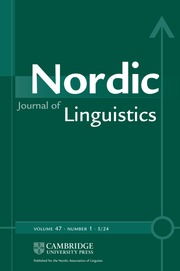The second issue of volume 47 (2024) of the Nordic Journal of Linguistics will be a special issue devoted to the effects of speaking differently from a norm. Across such diverse fields as sociolinguistics, sociophonetics, experimental linguistics, and interactional analysis we call for papers on empirically based studies of reactions towards speakers and/or speech that in some way or another is perceived as outside of a norm, for instance non-standard speech, dialect, ethnolect, L2 accent, or speech impairments. The issue will be edited by Nicolai Pharao and Pia Quist.
Inviting contributions based on empirical work in linguistics, the aim of this NJL special issue will be to expand the perspective within sociolinguistics on language attitudes and ideologies to studies that employ new methodologies, whether they use quantitative and/or qualitative measures, or consist of mainly experiments or ethnographic observations, etc. We also invite contributions that focus on the question of how norms are locally constituted and (re)shaped in everyday interaction through ideological moves as observed in empirical data. In the context of this special issue, we apply a broad understanding of the concepts of effect and norm, and contributions may employ different specifications. We understand effect in a broad sense as reactions by receivers in a given research setting, whether that is in experiments, interviews, or recordings of group conversations. The concept of norm is also understood in broad terms as expectations and standards that make people react and behave in a certain way. These may be linguistic standard norms connected to standard ideologies and power inequalities, but they could also be locally defined norms within a group or more locally in a conversation.
Studies of attitudes towards non-standard language typically show low degrees of tolerance towards linguistic variation, including dialect variation, the use of multiethnic youth styles, and foreign accents (Garrett Reference Garrett2010, Coupland and Kristiansen Reference Coupland and Kristiansen2011, Grondelaers and Kristiansen Reference Grondelaers and Kristiansen2013). As argued by Kristiansen (Reference Kristiansen2009), for instance (see also Labov Reference Labov1972), negative attitudes towards non-standard speech affect speakers’ linguistic choices, prompting them to accommodate to the standard norms and thus resulting in language change. Other studies have found that overtly stigmatized forms may be covertly upgraded (see Labov Reference Labov1966), leading to questions about the co-existence of multiple norms and how best to capture them empirically. More recently, questions have arisen about the effect of linguistic context (Levon Reference Levon2014, Pharao et al. Reference Pharao, Maegaard, Møller and Kristiansen2014) and the situational context (Sharma Reference Sharma2018, Sharma et al. Reference Sharma, Erez Levon, Ye and Cardoso2019) on the interpretation of non-standard features, with particular focus on ensuring the ecological validity of experimentally obtained data. Recent studies have also addressed the larger theoretical issue of what language users conceive of as a norm, particularly changing perspective from individual linguistic features to whole styles or registers (see Montgomery & Moore Reference Montgomery and Moore2018). The style perspective on language attitudes and ideologies has also led to a re-emphasis on multiple kinds of data, including analysis of how linguistic forms are used in interaction (Buchstaller Reference Buchstaller2009, Podesva Reference Podesva2011, Moore Reference Moore, Hall-Lew, Moore and Podesva2021), and even how language users overtly discuss particular forms either in direct interviews or in spontaneous group conversation.
Traditionally, sociolinguistics, socio-phonetics, and dialectology have been concerned with linguistic variation in terms of social and geographic distribution across social categories such as age, gender, and ethnicity. Seminal empirical studies have shown how such distribution results in different linguistic input in working class and middle class families respectively, leading to uneven attainment in education and labour (e.g. Heath Reference Heath1982, Hasan Reference Hasan2002; in Scandinavia also e.g. Scheuer Reference Scheuer1998, Røyneland Reference Røyneland2005). We also welcome papers within this line of research, i.e. studies of linguistic power and inequality, as long as the focus is on effects – reactions, attitudes, and behavior – of encountering non-conforming speech.
The deadline for the submission of articles will be 1 October 2023. The reviewing process will take place during late 2023 and early 2024. Submissions should be sent via the NJL ScholarOne/Manuscript Central site at https://mc.manuscriptcentral.com/njl. Please consult the Journal’s Instructions for Contributors at https://www.cambridge.org/core/journals/nordic-journal-of-linguistics/information/author-instructions and adhere as closely as possible to the guidelines for manuscript formatting. If you have questions about the special issue, please contact Nicolai Pharao (nicolaip@hum.ku.dk) or Pia Quist (pia.quist@hum.ku.dk).



